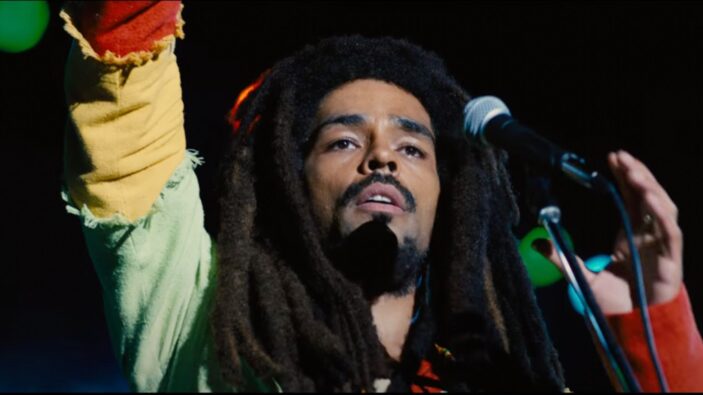
With all that Bob Marley achieved before his passing at only the age of 36, it makes sense that his life be served the biopic treatment, and with King Richard helmer Reinaldo Marcus Green as a director, there’s perhaps even more of a sense of how emotionally impactful such a tale could be. But seemingly too cautiously, Bob Marley: One Love, as sincere as it may be, never digs deep enough for us to really know the man beyond his catalogue of music.
The film begins in 1976 when Marley (played respectfully by Kingsley Ben-Adir) is already particularly famous. He’s cracked the elusive American market, and in Jamaica, his home country, he’s a certified icon. In a place where there’s political unrest and plagues of violence, Marley is hoping to unite his people through his music, putting on the “Smile Jamaica” concert. Two days prior to this event, there’s an assassination attempt on his life, one that leaves him injured and his wife, Rita (Lashana Lynch), unconscious in hospital, but this does nothing to deter his spirits, a trait the film honours as it showcases his need to bring his people together; he views his music as the ultimate tool for peace.
Knowing how Marley came to be as successful as he was, and especially how he brought reggae music to the mainstream, would have been a welcome story additive, especially as the script – which is a collaboration between Green, Zach Baylin (Creed III), Frank E. Flowers (Metro Manila) and Terence Winter (The Wolf of Wall Street) – only lightly touches on his childhood and, overall, stages its narrative as a series of events, rather than an exploration of a clearly powerful, beautiful man. We get major career moments, like when Marley and the Wailers found their sound for the influential “Exodus” album, and light insights into his personal struggles with his wife (mainly how fame is taking its toll on their relationship), but then more important, character-building notes like how he fathered numerous children outside of his marriage feel largely ignored.
I understand wanting to tread carefully in respecting Bob Marley as the figure he is, but being unafraid to showcase his flaws can only help tell his story further, and Green never quite feels safe enough to adhere to a more warts-and-all temperament. Similarly, the political throughline of the story is never as confidently addressed, leaving One Love as a more cliffs note edition of a larger tale still yet to be told.
Where the film earns its stripes however is in the casting of Ben-Adir. Though he doesn’t necessarily resemble Marley physically, his energy, accent and embodied persona make every second he’s on screen undeniably electric. He easily toes the line as an artist that craves the attention as much as he rejects it, and as much as the film itself can’t escape genre familiarity, he proves continually its most exciting facet.
Perhaps succumbing to the mentality of being too respectful of its subject, Bob Marley: One Love is far from being an in-depth analysis of one of the 20th century’s greatest performers. It can’t escape its formulaic temperament, but, as a nice trade off to audiences and fans, it’s a celebration of his music and his charisma, and that proves just enough for us to show this biopic-lite drama some love.
![]()
![]()
![]()
![]()
![]()
THREE STARS (OUT OF FIVE)
Bob Marley: One Love is now screening in Australian theatres.
